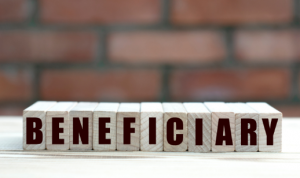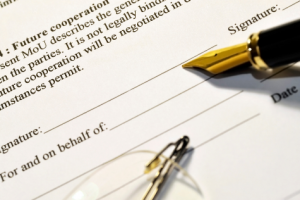
What Should be Included in a Will
Updated: December 12, 2022
 Your will should include basic personal information such as your full name, birthdate, and address. You should include any other names you go by, as well as the names of your spouse and family members and their relationship to you.
Your will should include basic personal information such as your full name, birthdate, and address. You should include any other names you go by, as well as the names of your spouse and family members and their relationship to you.
The remainder of the content of your last will and testament usually depends on your personal and financial situation, and should include all of the assets owned solely by you. These are known as probate estate assets. Any of these assets not accounted for in your will are managed by the probate court, so you may want to consider a residuary or “leftovers” clause to prevent this. It may be as simple as “I leave my remaining assets to _________“.
It is important that your will reflects your wishes and clearly states in enough detail to be faithfully carried out. Sometimes the body of the will is not adequate and you can use additional measures to do this.
- Codicils or addendums are used to provide a greater level of detail without making your primary will too unwieldy and more complicated to update. Although they are considered part of your will, they have the advantage of being able to be created or updated without having to update your entire will or consulting a lawyer.
- There are many forms available for specific tasks such as a Beneficiary Designation Form, Personal Property Memorandum, and Digital Assets Memorandum that can guide you through these tasks to provide additional detail and clarity.
- Sometimes it helps to add a no-contest clause to help discourage or even prevent your heirs from contesting your will and/or fighting or suing over who gets what.
To be valid, your will must contain proper legal language called Testamentary Intent that declares that the document is in fact a will, and not something else. A sentence like “This is my last will and testament,” is typical, but it can be anything that shows your intent to pass along property after your death. If you are going to make your own will you can purchase programs, such as Quicken WillMaker & Trust, that guide you through the process of creating a Will or Trust or you can down-load state-specific will templates to help with this.
Your Beneficiaries
List the names and ages of everyone you want to designate as a beneficiary. This protects these assets from being distributed by the probate court according to state law rather than your preference. This includes your spouse, children, siblings, and anyone else you want to leave assets to.
In some states you can use a Beneficiary Designation Form. You may also consider a survivorship clause that states that an individual must survive you by a predetermined amount of days in order to receive any inheritance from you. You could also make a list of those who you specifically want to disinherit who could otherwise be entitled to some of your assets.
 Be sure to revise your will when beneficiaries change to avoid leaving someone out or losing assets because someone has died.
Be sure to revise your will when beneficiaries change to avoid leaving someone out or losing assets because someone has died.
You may want to have contingencies for the possibility of a divorce or something happening to one of your beneficiaries.
To account for the death of a beneficiary, you can either designate an alternate beneficiary or provide details on how your assets would be distributed to the remaining beneficiaries.
Another option is a “residuary beneficiary,” a person that you designate to receive everything left in the estate after:
- Any specific gifts included in your will have been distributed;
- All non-probate property has been distributed; and/or
- All debts, taxes, and final expenses have been paid.
Your Choice of Executor/Personal Representative
The will designates a still-living person as the Executor or Personal Representative of the estate who is responsible for administering the estate.
Your Choice of Guardians for Minor Children or Dependent Adults
Your will can designate the person or persons who will raise your child/children or serve as guardian for other dependents such as incapacitated seniors, developmentally disabled adults, and pets.
- The guardians will have the legal authority to care for your dependents, who will be referred to as wards.
- They may or may not also be the executor.
Your Assets
For purposes of your estate plan, assets are any property, money, investments, possessions, and debts you have partial or total ownership of. For the sake of your last will and testament, not all of these assets need to be listed. You only need to list assets that will need to go through the probate process, which generally includes any property, accounts, etc. that are owned by you alone. Other types of assets are not required to be listed.
For tax purposes, many assets may need to have their value assessed.
Make sure you include assets you may not have considered, such as cryptocurrency or stored biological material, and what you would like to do with them.
Be sure to include instructions for complicated items, such as certain tools or antique cars.
Be especially aware about items with legal restrictions, such as firearms.
Accounting for Assets in Your Last Will and Testament
List all probate assets
The inventory list for your last will and testament should include all of your major and minor property, accounts, and sentimental items. The list of assets also includes a list of your debts, many of which the estate may be responsible for. This may include a mortgage, car loans or leases, credit cards, student, personal, and other loans, and outstanding taxes.
It will be helpful to list the specific assets that will be used to pay debts and expenses, such as probate and costs and funeral; although the money will only be available after the estate is settled by the probate court.
Once completed, the inventory list becomes part of the will and is filed with the probate court that will be responsible for your last will and testament after you die.
Because the inventory list is a part of your will, any changes require you to update your primary will. This does not affect any addenda.

Items to include in the inventory list.
- Real estate including your residence and any other real estate you own, including any in another state (requires a separate document in that state).
- Tangible personal property
- Art, jewelry, and collections
- Vehicles (in some states)
- Furniture and household items such as china and silverware
- Guns and other firearms — check the laws in your state
- Sentimental objects/items that you want specifically mentioned in your will
- Intangible (non-physical) Personal Property
- Money, including bank accounts
- Insurance policies
- IOUs
- Stocks, bonds or mutual funds outside the protection of a 401(k), IRA, or another retirement account.
- Copyrights
For details of what is considered solely owned vs jointly owned see Joint Ownership.
Personal Property Memorandum
In 30 states you can list your tangible assets in a Personal Property Memorandum. Tangible property is anything that can be touched; papers representing property do not count.
If it is mentioned in the will, it becomes a legal part of the will. Something like: “I am leaving a separate document from this will that disposes of some or all of my tangible personal property, that I direct to be incorporated into this will and followed by my executor. “
 Since the personal property memorandum is an addendum to your will, it gives you the ability to list and easily update all of your property without having to change the entire will.
Since the personal property memorandum is an addendum to your will, it gives you the ability to list and easily update all of your property without having to change the entire will.
By being specific in this document, you can prevent your personal possessions from becoming a significant source of will contests or a contest of wills involving family members.
Important things you must make sure of.
- The memorandum should not contradict your will or include any items that you’ve already accounted for in your will. You don’t want beneficiaries fighting over assets
- You should clearly describe listed items to avoid confusion with similar items.
- Many laws require these items to be described “with reasonable certainty.”
- You really want to be sure your executor can easily identify the items and get them to the intended person.
- Your executor needs to know how to get in touch with each beneficiary by including all the necessary information, such as the person’s relationship to you and postal and/or email address
You don’t need witnesses to watch you sign a personal property memorandum or to have your signature notarized.
Although part of the inventory list, you cannot include real estate or nonphysical/intangible property or business properties (in most states).
Keep it in the same place as your will, where your executor will be able to find it easily.
Digital assets memorandum
It seems like just about everything these days involves a computer or smartphone. With everything from email to digital music to online banking, we all have a digital footprint. Even some of your money may be digital, in the form of cryptocurrency.
Similar to the personal property memorandum, the digital assets memorandum (PDF) allows you to list and easily update your digital assets. It may be the most efficient way to guide your executor through this digital landscape.
Consider all the devices that need to be accounted for, some of which may be password protected. Common files or information may be stored on may include:
- Mobile telephones and smartphones;
- Desktops, laptops, and tablets;
- Peripherals and storage devices, such as external hard drives or thumb drives; and/or
- Kindle or Nook e-readers, whose manufacturers (Amazon and Barnes & Noble), may have credit card information stored
More daunting than the number of devices to look at is the number of locations and the amount and type of information that has to be dealt with. See the section The Digital World for details.
Most states have Digital Estate Planning Laws that allow your executor to access and manage this information.
Cryptocurrency
 Many people are not familiar with cryptocurrency and may have trouble understanding it. Cryptocurrency may not be recognized as a digital asset that can be passed on to beneficiaries and needs to be mentioned separately.
Many people are not familiar with cryptocurrency and may have trouble understanding it. Cryptocurrency may not be recognized as a digital asset that can be passed on to beneficiaries and needs to be mentioned separately.
Cryptocurrency is a digital asset that can be traded or used to buy items in a similar way to a debit card. Similar to changing values for currency exchanges which are tied to the vagaries of the market, cryptocurrency can change in value or buying power over time.
Aside from making sure that everyone is aware of your cryptocurrency and its value, there are other steps needed to assure it is inherited.
- Everyone involved with your estate needs to be familiar with this concept.
- Cryptocurrency must be listed in your will as an asset; it will become dormant if not recognized and used by your beneficiaries.
- There needs to be clear instructions for distribution among beneficiaries.
- You must share all the required information to access the digital asset, including the crypto keys, accounts, and security codes needed to access the currency.
- Remember: wills become part of the Public Record, so be careful what details about your cryptocurrency you include.
Provide specific distribution instructions for all of your assets
It is important to be specific about the distribution of your assets, including gifts you want to be given to specific beneficiaries. While you could leave it up to the beneficiaries/heirs to decide, it may not be the best action — especially for items of sentimental value.
- These instructions tell your executor and the court how to divide your assets, including who or what organizations are to receive them, when they will be received, and the amount or percentage of the total estate.
- This is fairly easy if you’re planning to leave everything to your spouse and/or children.
- You may want to check with beneficiaries first, since they may not want some assets. In that case, it could be sold, donated to charity, or given to a non-family member.
Be sure to revise your will when beneficiaries change to avoid leaving someone out or losing assets because someone has died. You may want to name contingencies for the possibility of something happening to one of the beneficiaries.
If you have specific gifts in mind, you will need to identify who will receive each asset. This includes gifts to individuals as well as the amount of any charitable donations.
- Make sure you have the correct Beneficiary Designation Form and account for all of your assets on it.
- A Personal Property Memorandum can make it easier to be more specific about individual items if you spread them around more.
 Other documents that can record specific instructions include College Investing Plan Accounts, Joint Tenant with Right of Survivorship and Tenants by Entirety accounts, Annuities, Health Savings Account, Transfer on Death account, and Payable on Death account.
Other documents that can record specific instructions include College Investing Plan Accounts, Joint Tenant with Right of Survivorship and Tenants by Entirety accounts, Annuities, Health Savings Account, Transfer on Death account, and Payable on Death account.
In addition to who will receive assets, you can be specific about how you wish your assets to be managed after your death.
- If any of your assets have monetary value, you may want to instruct your Executor to manage those assets in a specific way. For example, you may want credits/points/cash values to be redeemed for cash before being passed on rather than transferring the ownership.
- If you have assets that will continue to generate revenue, you may prefer they be transferred to someone who can continue to manage them rather than be sold and the cash being passed on.
You may use your will to forgive any outstanding debts owed to you.
If you are leaving anyone out of the will (disinheriting), specify this along with your reasons to reduce the chance of it being challenged. A surviving spouse is entitled to a certain share of the property in all states even if there is a will stating otherwise.
- This is called the surviving spouse’s elective share and the amount of the share varies by state. See the Inheritance Law section for more details.
- Most states allow community property with rights of survivorship which automatically transfers jointly-owned property to your surviving spouse.
- Unless otherwise agreed upon by both of you, one half of the property earned by you during your marriage belongs to the surviving spouse.
- You can dictate how your share of separate property (i.e. solely yours) is distributed, whether to your descendants or to the community property if previously agreed to.
- A Guide to Estate Planning Involving Digital Assets. Posted: The National Law Review website. February 17, 2019. Accessed: December 12, 2022.
- Assad A. Inventory List for a Last Will & Testament. Legal Beagle website. Accessed: December 10, 2021.
- Crail C, Haskins J, Watts R. How To Write A Will. Forbes Advisor website. Updated: October 31, 2022. Accessed: December 12, 2022.
- Haskins J.. What Assets Need to Be Listed for Probate? legalzoom website. Updated: November 10, 2022. Accessed: December 12, 2022.
- Kaminsky M. Estate Planning: 11 Things to Do Before You Die. legalzoom website. Updated: August 3, 2022. Accessed: December 12, 2022.
- Kaminsky M. Making a Will: A Quick Checklist. legalzoom website. Updated: June 1, 2022. Accessed: December 12, 2022.
- Leavitt L. List of 7 Assets You Should Include in Your Will. Cake website. Updated: July 27, 2022. Accessed: December 12, 2022.
- Randolph M. Using a ‘Personal Property Memorandum’ With Your Will. NOLO website. Accessed: December 12, 2022.
- Seidel M. What Is Included in Personal Items in a Will? Legal Beagle website. Posted: March 29, 2020. Accessed: December 12, 2022.
- Stiger B.. Putting Together An Estate Plan For Your Investments. Betterment website. Updated October 18, 2022. Accessed: December 12, 2022.
- Suh E. What to Include In a Will. Policygenius website. Published January 14, 2021. Accessed: December 10, 2021.
